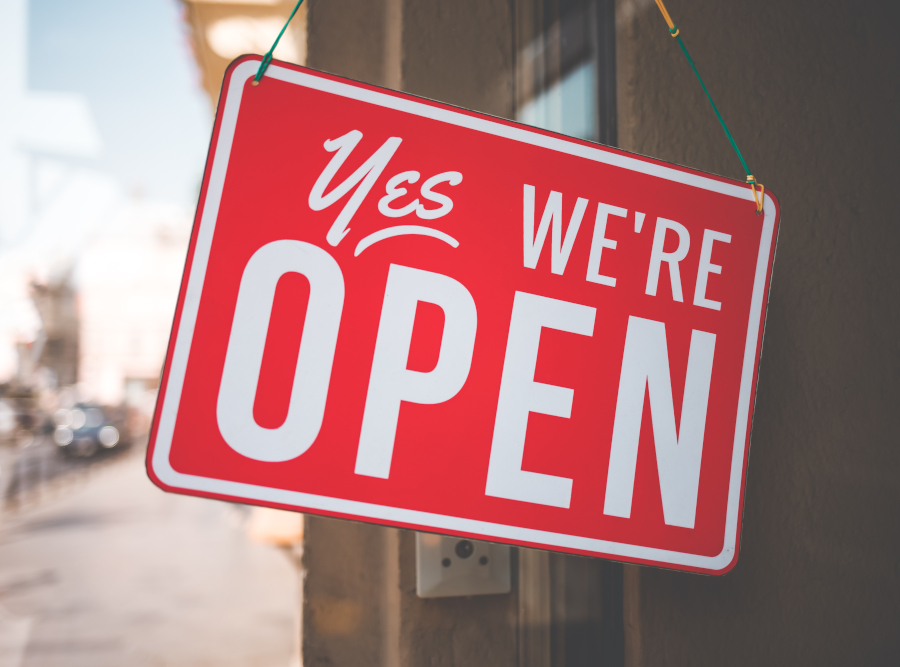On the evening of Monday 25th May, prime minister Boris Johnson announced ‘non-essential’ retailers will be allowed to reopen from Monday 15th June, so long as they adhere to new guidance to protect shoppers and workers.
This will have been the announcement that thousands of shops and retailers across England will have been waiting for, although some may be disappointed after initially believing that this move would allow them at the start of the month following an earlier briefing.
There will also be an inevitable degree of concern for these businesses as they look to resume trading while keeping staff and customers safe.
Reopening will undoubtedly create many challenges that will need careful consideration, which is why we have researched and written this guide to suggest six measures that business owners can take to reopen responsibly.
Cleaning
It has never been more important for surfaces to be thoroughly cleaned to prevent the spread of germs from one person to another. Door handles, handrails, lift buttons, and anything else which numerous people will touch throughout the course of a day need to be regularly cleaned. The government published some useful information in March on how to clean in non-healthcare settings to prevent the spread of COVID-19 which can be found here. Recommendations include:
- Wear disposable gloves and aprons during cleaning which should then be double-bagged and stored for 72 hours before being disposed of.
- Use either a combined detergent disinfectant solution (1000 ppm av.cl.), or alternatively a household detergent followed by disinfection. If another type disinfectant is used, check to make sure that it is effective against enveloped viruses.
- Use paper roll or disposable cloths to clean by hand and disposable mop heads to clean floors. Again, these should be stored in a secure location for at least 72 hours before being thrown away.
Hand washing and sanitising
Having hand sanitiser available throughout your premises will encourage people to keep their hands germ free. This is particularly useful at the entrance/exits of shops, encouraging people to sanitise as they enter and then again as they leave.
Public Health England advised that hand sanitisers should have 60% or higher alcohol content to be effective against COVID-19, so this is something to consider when ordering a stuck. We are able to supply hand sanitiser stations which can be purchased with 70% alcohol hand sanitiser as well as signage which can be used to ask people to sanitise or advise on the correct technique.
For staff, ask them to wash their hands with soap and water for 20 seconds at the start and every shift, and the same when they are taking breaks. Again, sharing with them how to correctly wash their hands and displaying this information could help this process be effective.
Social distancing
Social distancing has been largely credited for the reduction in COVID-19 cases as time has gone on, with the vast majority of the UK population observing these measures impeccably.
There is plenty that retailers can do to encourage or enforce a 2m social distancing policy to help keep their customers and staff safe, even in smaller shops where this is more difficult to accomplish.
Designating places for customers to stand when queuing is easy using floor stickers. These products give people a specific place to stand which removes any room for confusion, and can be removed afterwards without causing any damage to the floor. They can also be used to turn aisles in shops into one-way routes, meaning that everyone in that aisle is moving in the same direction and reduces the need to squeeze past other customers.
Some businesses such as Waitrose have appointed social distancing marshals whose job it is to remind people to keep the required distance from others. This will not be possible or necessary for all businesses, but for those who do choose to employ somebody to carry out this role, it is important to find the right person who will earn the respect of the customer while being able to communicate it a friendly and personable manner.
Homeworking and shift patterns
Where possible, allowing staff to work from home is ideal as that is a sure way of stopping them from potentially bringing COVID-19 into the business should they become infected, and also reduces the likelihood of them catching the virus themselves.
However, for many businesses this simply is not an option, particularly in retail. Where working from home is not feasible, there are still actions that employers can take to have a positive impact.
Staggering shift patterns will mean that fewer employees are at work at the same time. This will also help to prevent rush hours on public transport for those that have no choice but to use it, as not everybody will be starting and finishing work together as would normally happen. Fewer commuters on trains and buses allow for more opportunity to keep a safe distance from others.
Continuing this stagger for breaks also means that communal areas such as kitchens and break rooms are not overcrowded. Even better, asking staff not to congregate at all during breaks will hopefully mean that these areas either not used or used sparingly.
Finally, it is important to remind staff to only come into work if they are well and that nobody in their household is self-isolating or displaying coronavirus symptoms.
Limit footfall and discourage browsing
Restricting the number of people allowed in-store at any one time is something that supermarkets have done effectively during the peak of the virus, allowing them to keep the nation fed whilst keeping customers safe. This could potentially be even more important in small shops where space is limited, although it will have its drawbacks.
Firstly, you may need to have a designated person whose job it is to allow people in and out of the shop. Secondly, while people may be prepared to queue to get food, they may not be quite as keen when shopping for non-essential items.
Once in-store, you may also wish to ask customers to shop in a different way to how they would have done previously. Boots made the decision to stop customers from browsing, instead only allowing customers to shop who knew exactly what they needed to purchase. Meanwhile, some clothes retailers have restricted or removed access to changing rooms.
It stands to reason that somebody picking up several products to look at or try on clothes that they end up not buying could help to spread the virus, especially as the debate rages on as to how long it can survive on different surfaces.
Whichever policies you decide to impose, it is important to communicate them clearly from the outset so that customers know what to expect. Updating your website, posting on social media and emailing your existing customer base can give them this information before they leave the house. For those who have already travelled, advertising your policies using posters or window stickers can be effective.
Face coverings
There are different types of face coverings that are being used, although the effectiveness of these different solutions is a hotly debated topic.
Plastic face shields that have been certified by the British Standards Institution (BSI) and conform to the PPE Regulation and EU recommendation 2020/403 scheme can officially claim to ‘contain the COVID-19 virus and avoid its further spread.’ We’re pleased to say that the CE marked version of our face shields have been approved, and we would always recommend that you check with any potential supplier that their product has undergone the extensive testing that is required for them to be classed as PPE.
In regard to face masks that cover the nose and mouth, a report published on 4th May 2020 by the Royal Society’s DELVE (data evaluation and learning for viral epidemics) group summarised that ‘widespread risk-based face mask adoption can help to control the Covid-19 epidemic by reducing the shedding of droplets into the environment from asymptomatic individuals.’
After much speculation, the government moved on 11th May 2020 to advise that “people should aim to wear a face-covering in enclosed spaces where social distancing is not always possible and they come into contact with others that they do not normally meet, for example on public transport or in some shops.”
We are producing our own reusable face masks, although we are very clear that these are non-medical masks and not to be considered PPE. This is very deliberate on our part, as by offering these products we hope that people will not be tempted into depleting the stock of N95 masks which are essential for healthcare workers and first responders.
Should either of these solutions be appropriate for your business to provide your staff with, please get in touch and we would be happy to discuss how we can help, or alternatively place an order and receive free next-day delivery.
Summary
Ultimately, it will be up to each individual business owner to follow the regulations and put in place actions that make sense for their stores and branches. The above list is by no means exhaustive, but hopefully this will have given you some areas to consider. We wish you and your business and safe and successful reopening.




